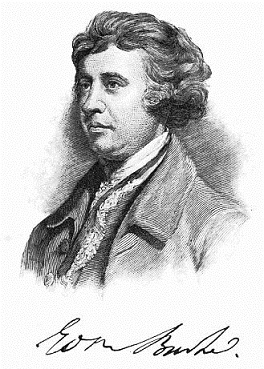
American Minute with Bill Federer

Edmund Burke is considered the most influential orator in the British House of Commons in the 18th century.
Born January 12, 1729, one of his first notable writings was an anonymous publication A Vindication of Natural Society, 1756, which was a satirical criticism of the deism promoted by Lord Bolingbroke:
“… seeing every mode of religion attacked in a lively manner, and the foundation of every virtue, and of all government, sapped with great art and much ingenuity … the same engines which were employed for the destruction of religion, might be employed with equal success for the subversion of government.”
Burke criticized how a deist “every day invents some new artificial rule.”
He described the “unalterable relations which Providence has ordained that every thing should bear to every other. These relations, which are truth itself, the foundation of virtue, and consequently, the only measures of happiness.”
Burke wrote in the tradition of Jonathan Swift, author of the satire Gulliver’s Travels (1726).
Swift also wrote in 1712, An Argument Against Abolishing Christianity, in which he defended Christianity against deists, freethinkers, atheists, anti-trinitarians, and socinians (unitarians).

Edmund Burke stands out in history because as a member of the British Parliament, he strongly opposed the slave trade.
He also defended the rights of the American colonies.
When America’s Revolutionary War began, Edmund Burke addressed Parliament with “A Second Speech on the Conciliation with America,” March 22, 1775:
“The people are Protestants; and of that kind which is the most adverse to all implicit submission of mind and opinion.
This is a persuasion not only favorable to liberty, but built upon it …”
Burke continued:
“All Protestantism … is a sort of dissent. But the religion most prevalent in our Northern Colonies is a refinement on the principle of resistance; it is the dissidence of dissent, and the protestantism of the Protestant religion.”
New York University Professor Emeritus Patricia U. Bonomi wrote in her article “Religious Pluralism in the Middle Colonies” that “… the colonists were about 98 percent Protestant.”
Edmund Burke is quoted in The Works and Correspondence of the Right Honorable Edmund Burke, Volume VI:
“The Scripture … is a most remarkable, but most multifarious, collection of the records of the Divine economy; a collection of an infinite variety of theology, history, prophecy, psalmody, morality, allegory, legislation, carried through different books, by different authors, at different ages, for different ends and purposes.”
Upon receiving news of the beginning of the French Revolution, Burke wrote October 10, 1789:
“This day I heard … the portentous state of France — where the elements which compose human society seem all to be dissolved, and a world of monsters to be produced in the place of it.”
On November 4, 1789, Burke wrote to Charles-Jean-François Depont in France:
“You may have subverted Monarchy, but not recover’d freedom.”

He publicly condemned the French Revolution in Parliament, February 9, 1790:
“The French had shewn themselves the ablest architects of ruin that had hitherto existed in the world.
In that very short space of time they had completely pulled down to the ground, their monarchy; their church; their nobility; their law; their revenue; their army; their navy; their commerce; their arts; and their manufactures …
There was a danger of an imitation of the excesses of an irrational, unprincipled, proscribing, confiscating, plundering, ferocious, bloody and tyrannical democracy …
In religion, the danger of their example is no longer from intolerance, but from Atheism; a foul, unnatural vice, foe to all the dignity and consolation of mankind; which seems in France, for a long time, to have been embodied into a faction.”
